- Home
- Charles de Lint
Yarrow Page 11
Yarrow Read online
Page 11
He often thought that if Rick could just settle down with someone like Stella— someone attractive and level-headed, a steadying influence— the success Rick needed would be attained a lot more quickly. Stella was mostly the reason that Bill had loaned Rick the remaining money he'd needed to start up Captain Computer. Maybe this time, he'd thought, but knew as he was handing over the check that it wouldn't work out any differently than any of the other endeavors Rick had plunged into with equal enthusiasm.
Knowing Rick as long as he did, it was easy for Bill to see the cold edge that undercut the charming front he wore. He realized now that hoping Stella would be the one to blunt it had been just another exercise in futility.
"You're going to love the food here," Rick said when they were seated and had ordered their cocktails. He was having trouble keeping his gaze from Debbie's cleavage. "Ever had prosciutto ham? It comes with the antipasta along with the usual salamis and Italian pickles."
"I thought I'd try the marinated artichoke hearts," Debbie said.
Rick shrugged. "Okay. But then you've got to go for the fettucine— homemade and served just like they make it at Alfredo's in Rome. Al dente."
He pronounced the Italian words with an atrocious accent, and grinned. Bill settled back in his chair, wishing he'd just had Rick come up to his office. Then he could have refused the request for a loan— which was bound to come up at just the "appropriate moment"— without having to sit through an evening of watching his erstwhile friend preen himself as he worked up to a new conquest.
Rick's college mentality of always having a good time still surprised Bill. It wasn't that Bill was a prude. He just felt there was more to life than this constant, almost desperate striving after women and booze. Looking at Rick right now, it wasn't hard to strip ten years or so from his face and hear him saying, as though it were only yesterday, "Met this chick like you wouldn't believe, Billy-boy. We got plastered— I mean piss-drunk— and made out in her old man's car, right there in the backseat while he was out mowing his lawn. The old bastard never saw a thing. I mean there's me, humping his 'princess,' while he's pushing the old mower back and forth…."
Bill sighed, and signaled to the waitress for a refill on his scotch.
Lisa Henderson and Judy Hudson stepped out of Rhapsody Rag Market just after six.
"God, it's hot," Lisa complained as Judy locked up.
"It's not so much the heat as the humidity," Judy said, repeating the most often-used description of an Ottawa summer. She dropped her key ring into her purse and turned to Lisa.
"Want to go for a drink?"
Lisa shook her head. "Brad had the day off, but he said he might give me a call after dinner, so I'm going to go home to take a shower and plan to spend the next couple of hours or so picking out something to wear."
Both women laughed.
"Don't settle for a movie," Judy said. "Hold out for dancing."
"On a night like this?"
"You could always cool down with another shower afterward— if you even wanted to cool down."
"'Save money— shower with a friend,'" Lisa said.
Judy's eyebrows lifted. "I thought we were both too young to remember that."
Lisa said goodbye to her co-worker and turned toward her bus stop. She was halfway down the block when she felt the tap on her shoulder. She turned, caught in the middle of daydreaming about showering with Brad, a blush on her cheeks.
All she could focus on were the eyes. Lysistratus's presence went through her like a shock. Last night's erotic dream returned in a flood of memory— not a dream!— and she started to back away, her feet entangling with each other. Lysistratus steadied her with a firm grip on her arm. His icy eyes enfolded her gaze, drew her into him, forced his will upon her with the sheer intensity of their presence.
"Won't you walk with me?" he asked.
No, she thought, but the word never got past her throat. The Valium that she'd taken to get her through the afternoon wasn't helping now. Tense, strung like a tight wire, she found herself nodding in reply.
Lysistratus led her down Bank Street. They turned right at Somerset and continued for a block and a half before they came to Dundonald Park— a block of mown lawn, bushes, and trees across from the Brewer's Retail.
When they sat down on a bench, she realized for the first time that he didn't look the same. The eyes were unchanged— powerful, blue as crystals, sucking all the warmth out of her body so that she shivered despite the heat. But his hair was dark now, and he had a mustache. Instead of his usual trendy clothes, he wore an old pair of faded jeans, a T-shirt, and carried an Adidas gym bag. Passing him on the street she might never have recognized him, except…
His eyes. When she'd turned, all she could see was those eyes.
They sat on the bench for long moments. The inability to control her own body movements paralyzed Lisa as effectively as the hypnotic spell in which he held her. Her thoughts were in a turmoil. What does he want with me? Why does he keep staring at me? Why can't I move?
His face leaned close to hers. Inwardly she shrank from him, but her body betrayed her and never moved.
"Sleep," he said softly.
His eyes enforced the word until it was all she could do to keep her remaining sense about her to fight the command.
"Sleep."
The voice stayed soft, sibilant as a snake's kiss.
No, she wanted to cry, but she still couldn't speak. What was he doing to her? This couldn't be happening to her. They were in the middle of a park, and it wasn't even dark yet. Didn't anyone see what was going on?
That man, walking his dog. Mister! Please help me!
But the man kept right on strolling, pausing only long enough to let his pet lift its leg against a no-parking sign before going on.
Sleep.
The voice was inside her head now. A bleak emptiness welled up behind it. She fought it, panicked beyond reason.
"Remember me to Hades," Lysistratus said.
The bleakness washed over her like a black wave. Lysistratus leaned forward, pressing his lips against hers. She slept. He forced her sleep to give birth to dreams, then drew their essence from her, sucked them in, through her skin, through his own, until his body was filled with their sweet nectar.
When he drew back, her body was stripped of its motor-workings— alive, but not alive. She might expire here on the bench. She might last until she was brought to a hospital, living the last bit of her life as a vegetable, but nothing could revive her now. He had stolen her soul.
He placed his hand across her eyes and closed the lids. He leaned her weight against the back of the bench and stood, dipping his head to her in a brief salute, before he walked off through the park.
Blocks away he stepped into an alleyway. When he was certain that he was not being observed, he exchanged the T-shirt he was wearing for a long-sleeved casual dress shirt from his gym bag. He rolled up the sleeves. The wig of dark-brown hair disappeared into the bag and a red one was removed and set in place on his head. He took a small mirror from his pocket and regarded himself critically. Into his cheeks, between the cheek and gums, he inserted cotton wadding to change the shape of his face. The mustache joined the wig in the bag. A pair of sunglasses completed his new disguise.
When he emerged from the farther end of the alley, walking with a slouch and the slight hint of a limp, not even his own mentor— three hundred eighty-two years dead now— would have recognized him at a quick glance. And a quick glance was all that anyone he passed on the street would give him.
One down, he thought. Two to go.
After dinner Cat and Peter took their coffees out to Cat's screened-in porch and sat there quietly, enjoying the cool breeze that had finally come with the fall of night.
"Were you planning on doing some writing tonight?" Peter asked after a while.
"No. I don't want to think about it for the moment. I think part of my problem might have stemmed from the pressure I was putting on myself. You kno
w— produce, produce!"
"For the introverted writer you were telling me about last night, you sure opened up today."
"I know. It was funny. I didn't feel any of my usual inhibitions at all. I can't explain it. I guess I just felt safe, sitting there behind your counter. And some of your customers were so nice. Like that fellow with the red hair and the wire-frame glasses."
"Lewis Reed."
"Umhmm. And your friend Ben. Does he write?"
"Not that he's told me. Why?"
"He seems to have such an immediate grasp as to what makes a story work and what doesn't. I think that's why I asked him if he'd take a look at my Silver Cup manuscript. Maybe he can help me work out my writing block, in case my dreams don't…." She looked away, suddenly uncomfortable, but before Peter could say anything, she went quickly on. "You know Ben's the only person to have picked up on the fact that Tattershank— the wizard in Cloak and Hood— really was one of the Middle Folk. That's why he had to help Meg. Most of the reviewers complained that he was acting out of character, but…" She paused again, this time feeling a little embarrassed. "Listen to me. I'm just rambling on."
"That's okay. I like listening."
"Anyway," she continued, "that's why I'd like Ben to have a look at The Moon in a Silver Cup. Without Kothlen…" She faltered, swallowed hard, then plunged on. "I've never shown anyone my unfinished stuff before. Not even Melissa— that's my agent, Melissa Robinson."
"Ben cares," Peter said. "It's that simple. If he's your friend, then he's your friend for life."
"That's the feeling I got," Cat said. "You know, I wish I'd known people like you and Ben when I was growing up. Everyone always talks about the physical changes you go through— puberty and all that— but nobody talks much about the changes you go through in your head.
"The most frustrating thing I can remember was being treated like a child when I didn't feel I was thinking like one. I always felt that I was being patronized— by my parents, by my teachers. From about the time I was ten I felt old. So I found it hard to relate to kids my own age as well. I guess I just turned inward. If I hadn't had my ghosts— I know what you think of them, but to me they're real— if I hadn't had them, I think I would have gone completely bonkers.
"With them I could be myself. I could be a ten-year-old with an old woman's mind, and nobody would treat me condescendingly. If I had questions, someone like… like Kothlen was there to answer them. To seriously answer them. If I got scared— just about being alive, maybe— they would talk me down. And if I wanted to be a hooligan or just plain silly, there was always Tiddy Mun and his cohorts. Especially Tiddy Mun."
She looked out into the darkness, lost in memories for a long moment.
"Going to the Otherworld was always great," she said suddenly. "At least for while I was there. But the trouble was, I still had to go through all the hours when I was awake— when I was in this world. I don't know this world all that well. Not the things that seem to count. All that having to cope with this world's done is to drive me further inward."
"I think everyone goes through something like that," Peter said. "To some degree or other. It's just growing pains. How you deal with them shapes what sort of person you become. I suppose there are some people who, no matter how old they get, never learn to deal with them."
"Like me?"
Peter shook his head. "No. Like the people who lose all their ability to stretch their minds. Our minds are very malleable when we're young. Most people lose that as they grow older."
"I wouldn't want to lose that. Not ever. And I still wish I'd known people like you and Ben when I was young."
"We were probably as confused as you were then, so we wouldn't have been much help. But we're here now. And there's not just Ben and me. There must be lots of people out in the world that you could relate to. All you've got to do is reach out— like you did yesterday with me. And today in the store. You might get burned sometimes, but that's the chance you've got to take."
Cat sighed. "I guess you're right. But it seems too hard. And what about the Otherworld? Do I have to hand in my passport to it, just to get along out here?"
"I don't know, Cat. I don't know what it is you feel when you're dreaming— where it is you go. If you even go anywhere. That inner world might seem real, but—"
"What about last night? I know you saw Tiddy Mun."
"I… I saw something, Cat. I just don't know what it was that I saw."
"Do you think I'm crazy, Peter?"
"No."
"Do you think I'm weird?"
"A little. But I like you that way."
She looked away again, wishing that things could always be just as normal as they felt right now. The night was so peaceful. The wind had just a breath of a Sibelius string concerto caught in its breathing. If there could be no prowlers…
"Do you ever get scared, Peter?"
"Sure. Everybody does. I think about our future: the way the economy's going and what it means for the store and my livelihood. I think of Reagan sitting south of the border, all primed to set off World War Three, and there's not a damn thing we can do about it. I'm scared of going to the dentist. Scared of dying…"
"That's the one thing that doesn't scare me," Cat said. "I figure that when I die I'll become a ghost for some other lonely kid."
"I'd like to meet one of your ghosts."
Cat looked wistful. "I wish there was a way that I could arrange that. I've been thinking of Tiddy Mun off and on all day. I wonder where he went?" She looked through the screen to the hedge, and goose bumps lifted on her arms. "I think there's something about my house that scares him now."
"Nobody's going to get into the house tonight, Cat. That's why I'm here."
"But what if someone does come? What if he's got a gun or something?"
"Then we call the police."
Cat thought about last night's visit to the Otherword, of what Tiddy Mun had told her about the evil thing that was hunting them— her and him and all the ghosts.
"What if it's something worse still?" she asked. "Like… like some kind of monster?"
God, that sounded stupid, she thought. But she couldn't shake the creeping feeling from her. Last night, when that malevolent presence came swooping down at her in the Otherworld…
"It's a monster all right," Peter said. "But a very human one. Someone who likes to harass women who live alone in big houses."
"I want to go inside," Cat said.
The night no longer seemed friendly. It gathered beyond the spill of the living room's lights, which were all that lit the porch, throwing shadows that were dark and impenetrable. Cat picked up their mugs. Before Peter could protest, she had already slipped inside.
Farley was cold sober and on the edge. Ever since that moment in Central Park this afternoon… Reality seemed to have taken a long step to one side, leaving him behind. He had a constant buzz between his ears, a feeling that hovered between a hangover and a headache. But the worst thing was this inescapable sensation of living on borrowed time. A feeling of impending doom.
"You're nuts," Ron said when Farley had tried to explain it to him. "What you need is a bellyful of hard juice, my man. Nothing else will do. The whole world loves a drunk. Or at least it loves a drink. I forget which."
Farley left Ron somewhere down on Rideau Street and went off to look for someplace safe. He was hunched down in the alley that ran through the four-story apartment building at the corner of Laurier and Bank. It was an old building, and it was dark in the alley. He didn't know if it was a safe place or not because he didn't know what he was hiding from. From himself, he might have said had anyone been there to ask.
He clutched his suitcase tightly to his chest. There was no one in the alley to ask him questions or keep him company. He was all alone, and how did you hide from yourself anyway?
Christ, he could use a drink.
"You don't understand," Rick said.
Bill took a sip from his second cappuccino. The coffee w
as rich and foamy, and it almost made up for the turn the conversation had taken. In one corner of the restaurant a man who looked like he'd stepped right off the set of some Italian extravaganza, complete with striped shirt and thick mustache, was playing sentimental music on an accordian.
"No, you don't understand," Bill said.
The argument had started after they'd finished their main course. While the waitress was serving their zabaglione— a custard and egg yolk mix, laced with marsala wine— Rick had begun his pitch.
"It's just another three, four thousand," Rick was saying now. "With the Christmas season coming up…"
Bill shook his head. He glanced at Debbie who, whatever other plans she might have for Rick tonight, was sensibly keeping out of this discussion.
"I know you, Rick," he said. "The only reason I went along with the first loan— against Emile's better judgement, I might add— was because I knew that if you did screw up like I expected you to, I could always write the whole thing off on my tax return. Why the hell do you think I had our contract drawn up the way I did? You might own Captain Computer in name, but on paper and until you make good your debt to me, I've got a piece of your business. I'm not liable to any other debts you might accrue, but when you go under you can bet your ass I won't be screwed. In fact, as things stand now, your going bankrupt right now would stand me in far better stead than if we let things go on as they were."
"Bill. We're old friends…."
"We were friends, Rick. But I haven't any more patience for your get-rich schemes. Not when you won't work at them yourself. I'll tell you this: if I thought you'd clean up your act and give it an honest go, I'd help you out. But the way things are going—"
"The way things are going? You sanctimonious bastard. What the hell do you know about how things are going?"
His voice was loud, and people at the neighboring tables were starting to turn their way. Bill stood up.

 Widdershins
Widdershins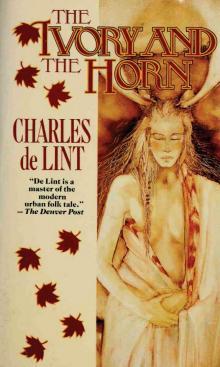 The Ivory and the Horn
The Ivory and the Horn Yarrow
Yarrow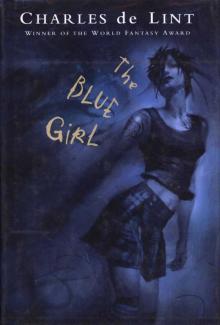 The Blue Girl
The Blue Girl Spirits in the Wires
Spirits in the Wires The Painted Boy
The Painted Boy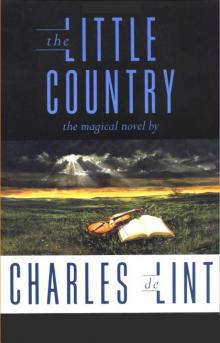 The Little Country
The Little Country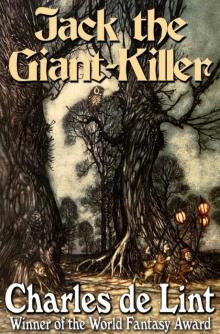 Jack of Kinrowan: Jack the Giant-Killer / Drink Down the Moon
Jack of Kinrowan: Jack the Giant-Killer / Drink Down the Moon Moonheart
Moonheart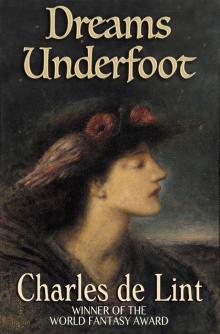 Dreams Underfoot
Dreams Underfoot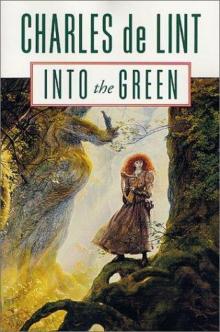 Into the Green
Into the Green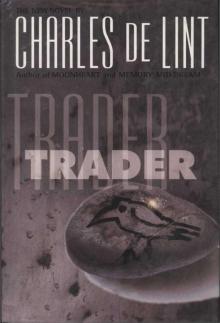 Trader
Trader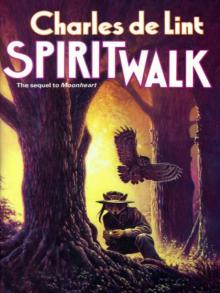 Spiritwalk
Spiritwalk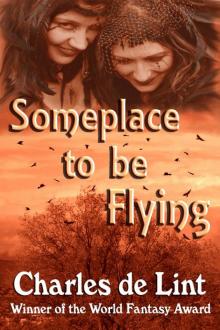 Someplace to Be Flying
Someplace to Be Flying Jack in the Green
Jack in the Green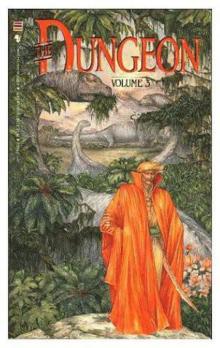 The Valley of Thunder
The Valley of Thunder Out of This World
Out of This World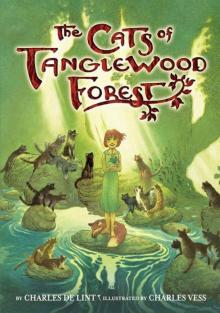 The Cats of Tanglewood Forest
The Cats of Tanglewood Forest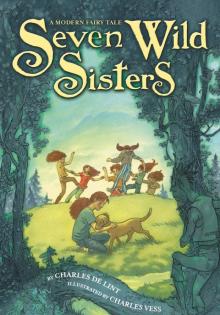 Seven Wild Sisters
Seven Wild Sisters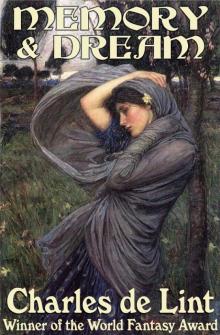 Memory and Dream
Memory and Dream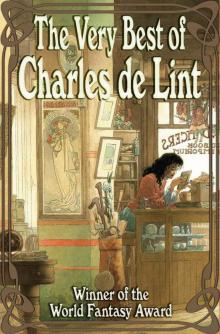 The Very Best of Charles De Lint
The Very Best of Charles De Lint Under My Skin
Under My Skin Forests of the Heart
Forests of the Heart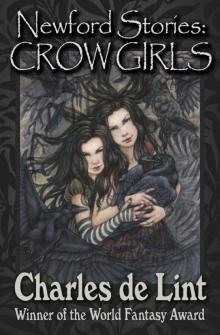 The Newford Stories
The Newford Stories Moonlight and Vines
Moonlight and Vines Angel of Darkness
Angel of Darkness The Onion Girl
The Onion Girl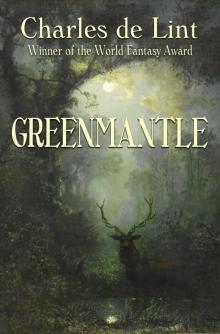 Greenmantle
Greenmantle Waifs And Strays
Waifs And Strays From a Whisper to a Scream
From a Whisper to a Scream Over My Head
Over My Head The Ivory and the Horn n-6
The Ivory and the Horn n-6 Our Lady of the Harbour
Our Lady of the Harbour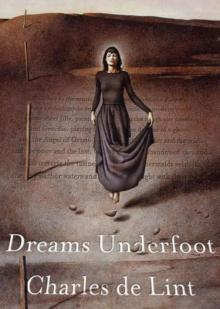 Dreams Underfoot n-1
Dreams Underfoot n-1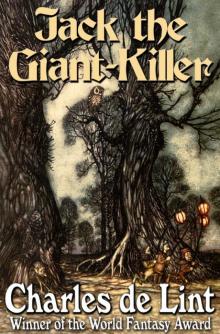 Jack the Giant-Killer (Jack of Kinrowan Book 1)
Jack the Giant-Killer (Jack of Kinrowan Book 1)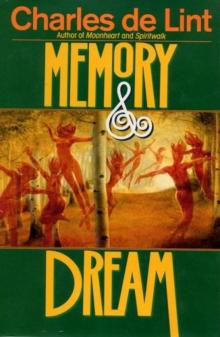 Memory and Dream n-5
Memory and Dream n-5 Under My Skin (Wildlings)
Under My Skin (Wildlings)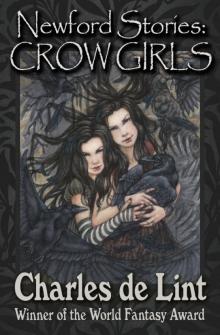 Newford Stories
Newford Stories The Wind in His Heart
The Wind in His Heart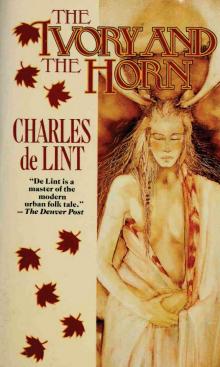 Ivory and the Horn
Ivory and the Horn